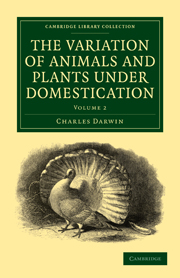Book contents
- Frontmatter
- Contents
- CHAPTER XII INHERITANCE
- CHAPTER XIII INHERITANCE continued – REVERSION OR ATAVISM
- CHAPTER XIV INHERITANCE continued – FIXEDNESS OF CHARACTER – PREPOTENCY – SEXUAL LIMITATION – CORRESPONDENCE OF AGE
- CHAPTER XV ON CROSSING
- CHAPTER XVI CAUSES WHICH INTERFERE WITH THE FREE CROSSING OF VARIETIES – INFLUENCE OF DOMESTICATION ON FERTILITY
- CHAPTER XVII ON THE GOOD EFFECTS OF CROSSING, AND ON THE EVIL EFFECTS OF CLOSE INTERBREEDING
- CHAPTER XVIII ON THE ADVANTAGES AND DISADVANTAGES OF CHANGED CONDITIONS OF LIFE: STERILITY FROM VARIOUS CAUSES
- CHAPTER XIX SUMMARY OF THE FOUR LAST CHAPTERS, WITH REMARKS ON HYBRIDISM
- CHAPTER XX SELECTION BY MAN
- CHAPTER XXI SELECTION–continued
- CHAPTER XXII CAUSES OF VARIABILITY
- CHAPTER XXIII DIRECT AND DEFINITE ACTION OF THE EXTERNAL CONDITIONS OF LIFE
- CHAPTER XXIV LAWS OF VARIATION – USE AND DISUSE, ETC
- CHAPTER XXV LAWS OF VARIATION, continued – CORRELATED VARIABILITY
- CHAPTER XXVI LAWS OF VARIATION, continued – SUMMARY
- CHAPTER XXVII PROVISIONAL HYPOTHESIS OF PANGENESIS
- CHAPTER XXVIII CONCLUDING REMARKS
- INDEX
CHAPTER XXII - CAUSES OF VARIABILITY
Published online by Cambridge University Press: 05 July 2011
- Frontmatter
- Contents
- CHAPTER XII INHERITANCE
- CHAPTER XIII INHERITANCE continued – REVERSION OR ATAVISM
- CHAPTER XIV INHERITANCE continued – FIXEDNESS OF CHARACTER – PREPOTENCY – SEXUAL LIMITATION – CORRESPONDENCE OF AGE
- CHAPTER XV ON CROSSING
- CHAPTER XVI CAUSES WHICH INTERFERE WITH THE FREE CROSSING OF VARIETIES – INFLUENCE OF DOMESTICATION ON FERTILITY
- CHAPTER XVII ON THE GOOD EFFECTS OF CROSSING, AND ON THE EVIL EFFECTS OF CLOSE INTERBREEDING
- CHAPTER XVIII ON THE ADVANTAGES AND DISADVANTAGES OF CHANGED CONDITIONS OF LIFE: STERILITY FROM VARIOUS CAUSES
- CHAPTER XIX SUMMARY OF THE FOUR LAST CHAPTERS, WITH REMARKS ON HYBRIDISM
- CHAPTER XX SELECTION BY MAN
- CHAPTER XXI SELECTION–continued
- CHAPTER XXII CAUSES OF VARIABILITY
- CHAPTER XXIII DIRECT AND DEFINITE ACTION OF THE EXTERNAL CONDITIONS OF LIFE
- CHAPTER XXIV LAWS OF VARIATION – USE AND DISUSE, ETC
- CHAPTER XXV LAWS OF VARIATION, continued – CORRELATED VARIABILITY
- CHAPTER XXVI LAWS OF VARIATION, continued – SUMMARY
- CHAPTER XXVII PROVISIONAL HYPOTHESIS OF PANGENESIS
- CHAPTER XXVIII CONCLUDING REMARKS
- INDEX
Summary
We will now consider, as far as we can, the causes of the almost universal variability of our domesticated productions. The subject is an obscure one; but it may be useful to probe our ignorance. Some authors, for instance Dr. Prosper Lucas, look at variability as a necessary contingent on reproduction, and as much an aboriginal law, as growth or inheritance. Others have of late encouraged, perhaps unintentionally, this view by speaking of inheritance and variability as equal and antagonistic principles. Pallas maintained, and he has had some followers, that variability depends exclusively on the crossing of primordially distinct forms. Other authors attribute the tendency to variability to an excess of food, and with animals to an excess relatively to the amount of exercise taken, or again to the effects of a more genial climate. That these causes are all effective is highly probable. But we must, I think, take a broader view, and conclude that organic beings, when subjected during several generations to any change whatever in their conditions, tend to vary; the kind of variation which ensues depending in a far higher degree on the nature or constitution of the being, than on the nature of the changed conditions.
Those authors who believe that it is a law of nature that each individual should differ in some slight degree from every other, may maintain, apparently with truth, that this is the fact, not only with all domesticated animals and cultivated plants, but likewise with all organic beings in a state of nature.
- Type
- Chapter
- Information
- The Variation of Animals and Plants under Domestication , pp. 250 - 270Publisher: Cambridge University PressPrint publication year: 2010First published in: 1868



